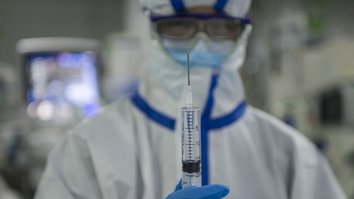BEIJING -- Reports confirmed by Chinese authorities about how thousands of residents of northwest China have tested positive for a bacterial disease after a leak from a state-owned biopharmaceutical plant are raising new questions about the country's safety standards and the origins of COVID-19.
Health officials in Lanzhou city said 3,245 people had contracted brucellosis, a disease often caused by close contact with infected animals or animal products that can bring about fevers, joint pain and headaches.
Chinese authorities admitted that a government-run biopharmaceutical plant used expired disinfectant in its production of brucellosis vaccines for animals between July and August 2019 -- meaning that the plant failed to eradicate the bacteria.
Contaminated gas from the China Animal Husbandry Lanzhou Biopharmaceutical Factory in Lanzhou formed aerosols containing the bacteria, and winds bore the pathogens to the Lanzhou Veterinary Research Institute, infecting almost 200 people there as of last December.
Unsafe practices at Chinese labs
This is not the first time that safety standards at laboratories in China have been in the spotlight.
After COVID-19 spread across the globe, world governments began searching for the origins of the deadly pandemic, which has infected more than 30 million people worldwide and left nearly a million dead as of Monday (September 21).
While most evidence points to a wet market in Wuhan, China, as the source of the coronavirus outbreak, an investigation into the matter is still progressing -- much to the annoyance of Chinese authorities who are attempting to portray China as the "hero" of the pandemic.
One of the theories is that COVID-19 leaked from a government-funded lab.
Strengthening that theory is documented evidence of foreign officials issuing several warnings about a research lab in Wuhan, China, saying it had inadequate safety measures while conducting risky studies on bat coronaviruses.
Two years before the COVID-19 outbreak, US State Department officials warned about safety and management weaknesses at the Wuhan Institute of Virology and proposed more attention and help, with specific concern over the "lab's work on bat coronaviruses and their potential human transmission" and how it represented "a risk of a new SARS [severe acute respiratory syndrome]-like pandemic".
One of the warnings detailed how the facility had a serious shortage of appropriately trained technicians and investigators needed to safely operate this high-containment laboratory.
Meanwhile, Beijing has been actively spreading disinformation about COVID-19 around the world and has been caught multiple times trying to steal coronavirus vaccine research.

![A researcher is shown at a lab in China on June 10. [NOEL CELIS/AFP]](/cnmi_st/images/2020/09/21/26174-pak1-585_329.jpg)







You have repeatedly written Pompeo's remarks, as we always hear this issue from the U.S. Secretary of State in the world’s media.
Reply5 Comment
Due to power seeking and harmful rivalries between countries, human beings are facing various problems on earth. If all human beings believe in the Hereafter and believe in the Hell and Heaven, they will never take the lives of innocent people. The Chinese are pagan and they do not believe in God. The only religion that can save the world and its people from this sinkhole is Islam. Islam is a religion for which people are ready to sacrifice their lives. Islam presents a prescription for all humanity to live as human beings, because the creator of humans is God, and God Himself knows what human should eat, what he should drink, and what he should wear, how he should worship. In all these things, there is wisdom. Therefore, we must follow God and do what God orders and must not do what God forbids us from doing so. When God tells us to eat beef, because it gives us benefit, we must eat it. When He says that we should not eat the flesh of wild animals, such as dog and snake, as it has harm for us, we must not eat it and follow God’s commandments so that God becomes pleased and we succeed.
Reply5 Comment
The communist regimes are like this. Death to China and the dirty Chinese.
Reply5 Comment
It was clear from the beginning that corona virus was leaked out from research laboratories in China. This country was doing harmful researches which finally led to the spread of corona-virus in the world. All countries in the world should sanction China for not controlling the virus, because if China does not face sanctions, any other country may also do the same in the future and create problems for the people of the world. World War III will be a biological war. The spread of corona-virus was a preliminary stage of this war. It was a probationary stage to see if this biological weapon works or not.
Reply5 Comment
Left and right Ideological regimes were not and are not reliable at all.
Reply5 Comment